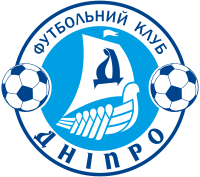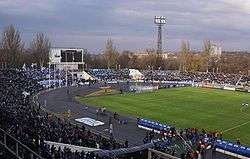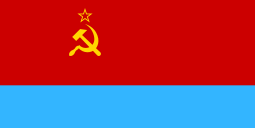FC Dnipro
Football Club Dnipro (Ukrainian: Футбо́льний Клуб «Дніпро́», IPA: [d⁽ʲ⁾n⁽ʲ⁾iˈprɔ] (![]()
 | |||
| Full name | Football Club Dnipro | ||
|---|---|---|---|
| Nickname(s) | Warriors of light | ||
| Founded | 1918 | ||
| Dissolved | 2019 | ||
| Ground | Dnipro-Arena, Dnipro | ||
| Capacity | 33,993 | ||
| Owner | Ihor Kolomoyskyi | ||
| President | Ihor Kolomoyskyi | ||
| Head coach | Oleksandr Poklonskyi[1] | ||
| League | Ukrainian Amateur League | ||
| 2018–19 | 8th, Group 3 | ||
| Website | Club website | ||
|
| |||
Dnipro, named after the Dnieper river in Ukraine, is the name taken by a range of sports clubs in its city. Besides the association football club, there are also bandy[3] and basketball teams, among others, with the same name. FC Dnipro, however, is not a multi-sports club. The club is owned by the Privat Group that also owns BC Dnipro and Budivelnyk Kyiv.
During the Soviet era, the club was a member of the Soviet Volunteer Sports Society "Metallurg" (therefore it carried names Metallurg/Metalurh and Stal) and until 1961 was under sponsorship of the Petrovsky Dnipropetrovsk Metallurgical Plant. After that, the club was sponsored by the Southern Machine-building Plant Yuzhmash and carried both names Russian Dnepr and Ukrainian Dnipro, while Dnepr was also used for international competitions. During the Soviet era, the club was the second most successful club, based in Ukraine, that participated in the Soviet Top League, winning in 1983 and 1988. After the fall of the Soviet Union, the club was privatized.
History
BRIT
The club was formed in 1918 by the Petrovsky factory and was called BRIT (Brianskyi Robitnychyi Industrialnyi Tekhnikum). The team participated in the regional competition, the Katerynoslav championship. BRIT played its games in the "Sokil" stadium, a small venue located at the corner of Pushkin and Yuriy Savchenko streets, which it shared with four other clubs.
Petrovets – Stal – Metalurh
With the outbreak of World War I, BRIT was disbanded until 9 May 1925, when a new team was formed in Dnipropetrovsk. The team participated during the first season under the name Petrovsky factory, which was changed in 1926 to "Petrovets." The team entered the first Soviet competition under the name of Stal (steel) in 1936, participating in three championships before World War II. In 1947, the team re-entered the Soviet competition after merging with another club from Dnipropetrovsk, Dynamo Dnipropetrovsk. From 1949 until 1961, the team was called Metalurh ("metal worker"). From 1950–1952, it was relegated to amateur status due to poor results. In 1954, Metalurh Dnipropetrovsk reached the semi-finals of the USSR Cup, where it lost to Spartak Yerevan.
Dnepr
In 1961, the team was handed over to its new sponsor, the Yugmash (the Southern machine-producing factory), which at that time was one of the most powerful factories in the entire Soviet Union and was funded by the Ministry of Defense. It was part of the Zenit volunteer sports society. The new sponsor changed the team's name to the Russian name of Dnieper River, Dnepr, as the Russian was the accepted language of the Soviet Union and the Soviet government. The team's performance did not change much until after 1968, when Dnepr obtained Andriy Biba and the new coach – Valery Lobanovsky. After that, it took the team three years to get promoted to the Soviet Top League and eventually finished in sixth place in 1972.
Golden generation
In 1973 and 1976, Dnepr reached the semi-finals of the USSR Cup. In 1978, the team was relegated to the lower league for two years. Their next return to the top flight was not as inviting as their first one and the team languished at the bottom of the table for several years. In the following years, the governing body of the team hired new promising coaches – Volodymyr Yemets and Hennadiy Zhizdik. After those changes, Dnepr became a strong contender for the Soviet championship winning it twice: once with Yemets and Zhizdik in 1983, and another one with Yevhen Kucherevsky in 1988. Also, in 1989 Dnepr became the first professional football club in the Soviet Union. During those years, the team featured many notable players such as Oleg Protasov, Hennadiy Lytovchenko, Oleksiy Cherednyk and Oleh Taran.
Dnipro
Following the collapse of the Soviet Union, the club took on the Ukrainian version name of Dnipro, the name of the biggest river and one of the major symbols of Ukraine. The club joined the football federation of the native country and remained one of the top contenders in the newly formed Ukrainian Premier League. The team received a silver medal in 1993, as well as the bronze in 1992, 1995, 1996, 2001 and 2004. The team also reached the Ukrainian Cup finals in 1995, 1997 and 2004, losing all three to Shakhtar Donetsk. Dnipro is currently controlled by the Privat Group.
Success and downfall
On 14 May 2015, Dnipro qualified for the 2015 UEFA Europa League Final by defeating Napoli 1–0 in Ukraine after having drawn 1–1 in Italy, the first time in the club's history that it reached the final in a European competition.[4] Despite going up 1–0 in the sixth minute against Spanish side Sevilla, Dnipro eventually lost 3–2.[5] Despite the defeat, the match crowned one of the club's greatest seasons, during which Dnipro had to play all of their home matches some 400 kilometres away in Kiev due to the conflict in eastern Ukraine.[6] On 31 March 2016, the club was excluded by UEFA from participating in the next UEFA club competition for which it would otherwise qualify in the next three seasons (2016–17, 2017–18 and 2018–19) for violating the Financial Fair Play regulations.[7]
In late June 2016, there were rumours that club owner Ihor Kolomoyskyi had stopped funding the club.[8] Kolomoyskyi immediately denied this but did state, "The club will not exist in the same form as before;" and that it was "not normal to spend crazy amounts of money" to keep the current squad intact.[8]
The 2016–17 season was disastrous for Dnipro. Due to outstanding debts owed to coach Juande Ramos and his staff, the FFU prevented Dnipro from signing new players other than free agents. On 26 October 2016, Dnipro was assessed a penalty of 6 points for the same reason. In April 2017, 3 additional points were deducted. At the conclusion of the 2016–2017 season, Dnipro were relegated directly to the Ukrainian Second League (third level) for the first time in club history.
In the 2017–18 season the club with a new squad started well in the Group B of the Second League, for 13 matches in row going on high positions (second-fourth places). But the points have been deducted once more with their number reaching up to 18 until the end of the season, which resulted in club finishing on 8th place.
On 7 June 2018 FIFA decided to once more relegate the club and for the 2018–19 season the club was to play in the Amateur League.[2] In the 2019–20 Amateur League the club did not participate.[2][9]
Stadium

Since 1966, Dnipro's home was Meteor Stadium in Dnipropetrovsk. Prior to that, the club played at the Metalurh Stadium (formerly Stal Stadium). Meteor Stadium was built by the Soviet rocket company Yuzhmash on the original site and has undergone several renovations since, the last one being in 2001. In 2002, however, after several spells in European competitions, it became clear that the club needed a new modern venue. Thus, in 2005, Pryvat Group started construction of Dnipro Arena in the centre of the city. The club played its last game at Meteor on 2 September 2008, against Metalist Kharkiv.
In April 2005, the club's new arena broke ground. It was constructed by Germany's largest construction company Hochtief. The construction itself took three years and four months, but a nine-month delay occurred due to a land dispute over a site where the stadium's car park was planned. The stadium's final capacity is 31,003 people and the initial estimated cost of the construction was set at €40 million.
The stadium was opened on 15 September 2008. The opening ceremony featured a speech by Ukrainian president Viktor Yushchenko, a concert performance by a number of famous Ukrainian musicians and two football matches: Veterans of Dynamo Kyiv vs. Spartak Moscow veterans, and Dnipro against Dynamo Kyiv. As a gift to the club from the city, the street that the stadium is situated on was renamed into Kucherevskyi Boulevard, in honour of Dnipro's late coach Yevhen Kucherevskyi. Dnipro played their first official game on 29 September 2008 against their local rivals Metalurh Zaporizhya, but Dnipro lost 1–2. They set a new attendance record for the Ukrainian Premier League 2008–09 season at 31,000 spectators.
Since the beginning of conflict in Eastern Ukraine, Dnipro have played their European matches at the Olympic Stadium in Kyiv at the behest of UEFA, although there has been comparatively less conflict in Dnipropetrovsk than other areas.[10]
Supporters and rivalries
The formation of the fan movement in Dnipropetrovsk began in the early 1980s, which saw the appearance of the first representatives of Dnipro ultras at the stadium. Later was established one of the largest fans unions – the Braty po Zbroyi (English: Brothers in Arms) – involving Dnipro, Dynamo Kyiv and Karpaty Lviv.
Most of the fans hold right-wing ideological views (Ukrainian nationalism). Dnipro is considered the third most popular club in Ukraine, and home and away matches are attended by large crowds. The largest Dnipro ultras groups are the Voice of the North Stand (Ukrainian: Рупор Північної Трибуни) and Ultras'83 (Ukrainian: Ультрас'83).
The most famous derby in eastern Ukraine is the Skhidne Derby (English: Eastern Derby) between Dnipro and Metalist Kharkiv. The game at the stadium is very hard and almost every game ends in a fight between football fans from Dnipropetrovsk and Kharkiv. There was also a city derby in Dnipropetrovsk between Dnipro and Kryvbas Kryvyi Rih. In May 2016, Metalist Kharkiv was removed from Ukraine's professional football leagues.[11] Kryvbas Kryvyi Rih is, after its 2013 bankruptcy, an amateur club.[12][13]
Dnipro maintains friendly relations with Karpaty Lviv, Dynamo Kyiv (the fan union Braty po Zbroyi) and Veres Rivne. Dnipro has strained relations to Shakhtar Donetsk, Metalurg Zaporizhya, Chornomorets Odesa, Metalist Kharkiv, Kryvbas Kryvyy and Arsenal Kyiv. All fans, however, have currently declared a truce due to the war in Eastern Ukraine.
After the disappearance of Metalist and its fans creating a new club called Metalist 1925, as well as the fall of Dnipro happened at the same, both clubs met in the Second League. However this, as well as hatred towards SC Dnipro-1, united those rivals, who shared a place in the stands during the game of Dnipro-1 versus Metalist 1925. After the fall of Dnipro into the amateur leagues, Dnipro fans tried to establish a new club Dnipro 1918 with a similar goal to the one of Metalist 1925, which united the fans even more. After Dnipro 1918 and later Dnipro both ceased to exist, the Kharkiv fans supported FC Dnipro, sometimes shouting Dnipro and displaying the "Dnipro must live" banner on the stands.
After the creation of SC Dnipro-1 in 2017, a rivalry between two clubs started. This has resulted in a fight during one of the derbies. In this rivalry fans of FC Dnipro are allied with former enemies — ultras from Kharkiv, who support newly formed Metalist 1925 with whom they have once set in guest's ultras zone during the match Dnipro-1 : Dnipro.
Sponsors
Home colours
|
1983
|
1988
|
1991
|
1992
|
1992
|
1993
|
2000
|
2000
|
2011
|
2013
|
2014
|
Honours
Domestic
- Soviet Top League
- Ukrainian Premier League
- Soviet Cup
- Winners (1): 1988–89
- Ukrainian Cup
- Soviet League Cup
- USSR Super Cup
- Winners (1): 1989
- Runners-up (1): 1984
- Football Championship of the Ukrainian SSR
- Runners-up (1): 1936
European
- UEFA Europa League
- Runners-up: 2014–15
Friendly
- Marbella Cup
- Costa del Sol Trophy
- Casino Marbella Cup
- 2014
- AdF Diamonds Cup
- 2014
Individual player awards
Several players have won individual awards during or for their time with Dnipro


Ukrainian Footballer of the Year





Ukrainian Premier League[15] Footballer of the Year



Last Squad
Note: Flags indicate national team as defined under FIFA eligibility rules. Players may hold more than one non-FIFA nationality.
|
|
Coaches and administration
| Administration[18] | Coaching[19] |
|---|---|
|
|
Seasons scope
Soviet Union


Ukraine

European history
FC Dnipro participates in European competitions since 1984 after playing its first against Trabzonspor. Since 2001, however, the club participates almost on annual basis with variable successes. This was interrupted in 2016, when, despite finishing third place, Dnipro was forbidden to play in the European competitions by UEFA.
| Season | Stage | Notes | |
|---|---|---|---|
| European Cup / UEFA Champions League | |||
| 1984–85 | Quarter-Finalist | eliminated by | |
| 1989–90 | Quarter-Finalist | eliminated by | |
| UEFA Cup / UEFA Europa League | |||
| 2014–15 | Finalist | defeated by | |
Presidents and owners
- 1992–1997 Ihor Bakay (Intergaz)
- 1997–1998 Serhiy Tihipko (Privat Group)[20]
- 1998–2019 Ihor Kolomoiskyi (Privat Group)
Managers

.svg.png)



















Notes
- The club has not been active since its 2018–19 season in the Amateur League.[2]
References
- Oleksandr Poklonskyi is heading FC Dnipro (Александр Поклонский возглавил ФК "Днепр"). Ukrinform. 21 June 2017
- "Kolomoisky announced the restoration of the Dnieper" (in Ukrainian). football24.ua. 21 October 2019. Retrieved 8 January 2020.
- "Ukrainian bandy championship". Ukrainian Federation of Bandy and Rink-Bandy. Archived from the original on 16 June 2013. Retrieved 16 May 2014.
- "Dnipro's Yevhen Seleznyov sinks Napoli to seal Europa League final place". Guardian. 14 May 2015. Retrieved 15 May 2015.
- "Dnipro 2 Sevilla 3". BBC Sport. 28 May 2015. Retrieved 28 May 2015.
- "Dnipro Dnipropetrovsk – Angels amidst War : "During the entire course of the campaign, FC Dnipro Dnipropetrovsk had to play all of their home matches some 400 kilometres away in Kyiv due to the war. "". goaldentimes.org. Retrieved 26 May 2015.
- "CFCB adjudicatory chamber orders". UEFA. 31 March 2016.
- "Dnipro football team will not be liquidated, but revamped – Kolomoisky". Interfax-Ukraine. 30 June 2016.
- Yuriy Samotkan. "Dnipro" probably will be liquidated ("Днепр", вероятно, прекратит существование). Footboom. 6 June 2019
- "Dnipro qualifier moved to Kiev". ESPN. Press Association. 23 July 2014. Retrieved 15 May 2015.
- Апеляційний комітет ФФУ відхилив апеляції "Металіста" та "Говерли" [The FFU Appeal Committee decline appeals of Hoverla and Metalist] (in Ukrainian). Football Federation of Ukraine. 16 May 2016. Archived from the original on 16 May 2016. Retrieved 16 May 2016.CS1 maint: BOT: original-url status unknown (link)
- "FC Kryvbas launches bankruptcy procedure". Interfax-Ukraine. 12 June 2013.
- (in Ukrainian) Gen.Director of Kryvbas: The team has marvelous chances to start playing in the PFL already this summer. Kryvbas fan's side. 6 April 2016
- Jerseys of Ukrainian clubs Archived 25 September 2013 at the Wayback Machine
- before fall of the Soviet Union the award was given to players of Ukrainian clubs
- "Main Team :: Team :: FC Dnipro :: Official Site :: www.fcdnipro.ua". www.fcdnipro.ua. Retrieved 24 August 2017.
- http://pfl.ua/teams/14-dnipro
- "Руководство :: Клуб :: ФК "Днепр" :: Официальный сайт :: www.fcdnipro.ua". www.fcdnipro.ua. Retrieved 24 August 2017.
- "Coaches :: Team :: FC Dnipro :: Official Site :: www.fcdnipro.ua". www.fcdnipro.ua. Retrieved 24 August 2017.
- Valerko, A. You hit a "goal post" (Вы попали в штангу). Football.ua. 9 September 2012
- (in Ukrainian) Official: Ramos left the Dnipro, because they do not want to stay in Ukraine, Ukrayinska Pravda Champion (22 May 2014)